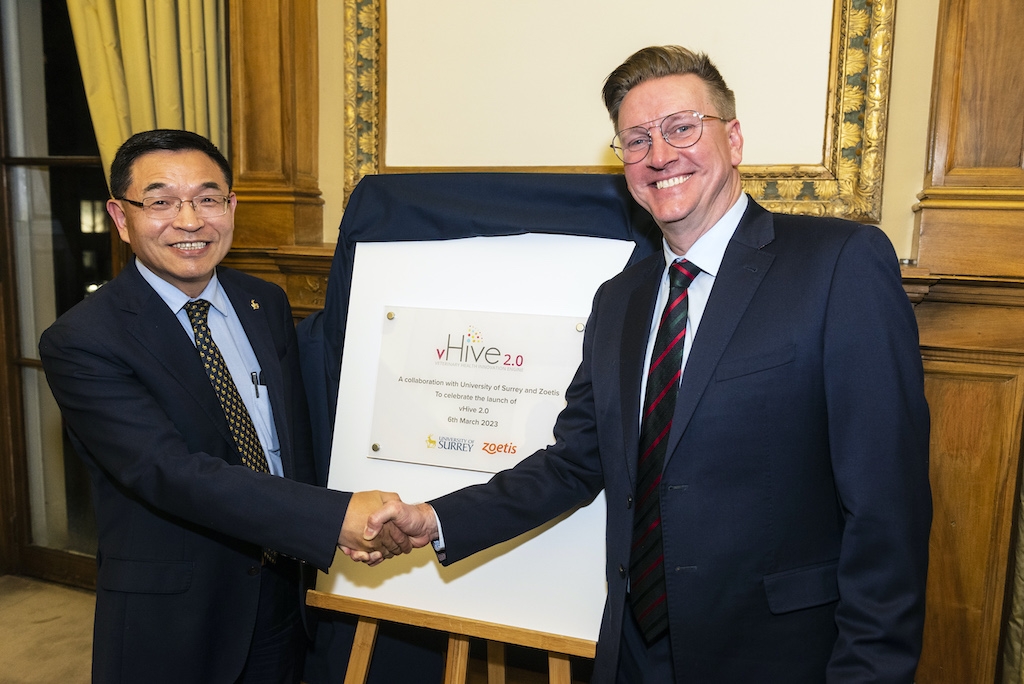
Professor G Q Max Lu - President and Vice-Chancellor, University of Surrey (left) with Jamie Brannan, Executive Vice President and President, International Operations and Aquaculture at Zoetis
The University Of Surrey And Zoetis Launch VHive 2.0 To Strengthen Partnership In Driving The Development Of Next-generation Animal Health Innovations
One of the country’s leading research education institutions, The University of Surrey, and the world’s leading animal health company, Zoetis, today launch vHive 2.0 to strengthen their commitment towards improving Animal Health by using new technologies, digital analytics and artificial intelligence.
The Veterinary Health Innovation Engine (vHive) was first launched in 2015 through a partnership between the new University of Surrey School of Veterinary Medicine and Zoetis. Since 2015, vHive has become an international player in animal health research. vHive has acted as the catalyst for bringing together partners across the M3 corridor into the UK Government’s High Potential Opportunity – showcasing that Surrey and SE England are some of the best places to conduct animal health research globally.
Rimma Driscoll, Executive Vice President and Head of Global Strategy, Commercial and Business Development, and Global BioDevices at Zoetis said: “There is a very good complementarity on the expertise that Zoetis and University of Surrey are contributing to in this partnership towards innovation and forward-thinking technologies in this sector. We expect that vHive will benefit the agri-health industry tremendously and towards sustainability. As part of vHive 2.0 we are pleased to announce the creation of a sector-specific animal health incubator focused on start-ups innovating across the continuum of care in both companion animal and livestock.”
vHive 2.0 aims to expand on the successes of the original vHive partnership by investing in the latest cutting-edge technologies from human health such as AI, biomarkers, big data and health informatics. By taking the learnings from human health, vHive 2.0 will use real-world data to develop novel actionable insights and solutions, supporting veterinarians, pet owners and farmers where current research to date has been limited.
“To advance animal health, it is important to utilise all the available data and use it well with modern informatics methods. vHive will break down silos that have existed in the past, developing multidisciplinary research for improved animal health. vHive’s core focus is the ability to generate and collect lots of different types of data into a single platform for analysis. Crucially, this is designed for industrial need – data can be stored in a trusted, secure environment and only made accessible to those who need it. From there, we move to solutions to improve animal health and food security,” said Prof Tony Whetton, Director of vHive.
Jamie Brannan, Executive Vice President and President, International Operations and Aquaculture at Zoetis added: “We are honoured to be part of vHive and now vHive 2.0, as the outputs will be relevant for industry development – helping to advance the animal health sector globally. Investing in innovation is crucial for Zoetis and its customers as we look to deliver the next generation of solutions for improving the health and welfare of animals.”
“This initiative also fortifies Zoetis’ commitment towards animal health innovation, and we take pride in our continued partnership with University of Surrey, which we are sure will bring greater success and opportunities in time to come,” added Rimma Driscoll of Zoetis.
Amongst its many collaborative achievements, vHive contributed to the African Livestock Productivity and Health Advancement initiative (A.L.P.H.A.) goals to improve access to animal health and services in Sub-Saharan Africa. vHive veterinary innovation specialists partnered with Zoetis to help reduce prevalence of diseases and improve productivity for African farmers. The A.L.P.H.A. initiative is helping to train over 100,000 veterinary professionals and treat over 100 million animals across sub-Saharan Africa by 2025.
vHive 2.0 is already working to deliver new insights and has recently pioneered the use of social listening – a tool to analyse social media commentary – to determine how best to support pet owners with common conditions. When combined with other forms of data e.g. wearables or welfare metrics, this has the potential to lead to improved decision making – resulting in better outcomes for pets and farmed animals.
Prof Paul Townsend, Pro Vice Chancellor and Executive Dean of the Faculty of Health and Medical Sciences, University of Surrey said: “We are proud to share that since the vHive’s inception in 2015, we have already won the High Potential Opportunity Award – for our partnership with Enterprise M3, an Animal Health Innovation Network. This is just one of the many great achievements we have had with vHive.”
The University of Surrey has a long and distinguished heritage in both research and innovation dating back to its origins as the Battersea Polytechnic Institute, founded in 1891. The university’s veterinary school was the second in the UK since it opened in 1965. It has brought leadership in health informatics, bioinformatics, proteomics, biomarker discovery, genomics, transcriptomics, oncology and biobanking/epidemiology to the faculty and the campus which is going to help transform animal health leverages on breakthroughs in human health.
The launch which took place in the Royal Society, London, saw a list of distinguished guests including UK minister of Science and Innovation, George Freeman, industry leaders, potential investors as well as executive teams from both University of Surrey and Zoetis.
More from University of Surrey
- Exotic pet care: expert comment
- Expert comment: The importance of teaching children about zoonotic diseases and how to safely interact with animals
- Award-winning vet calls for end to poor dog breeding practices
- Rapid test to detect the causative agents of pneumonia in calves
- The British Horse Society (BHS) appoints new Veterinary Student Champion for 2022

 3 years ago
3 years ago  2865 views
2865 views
